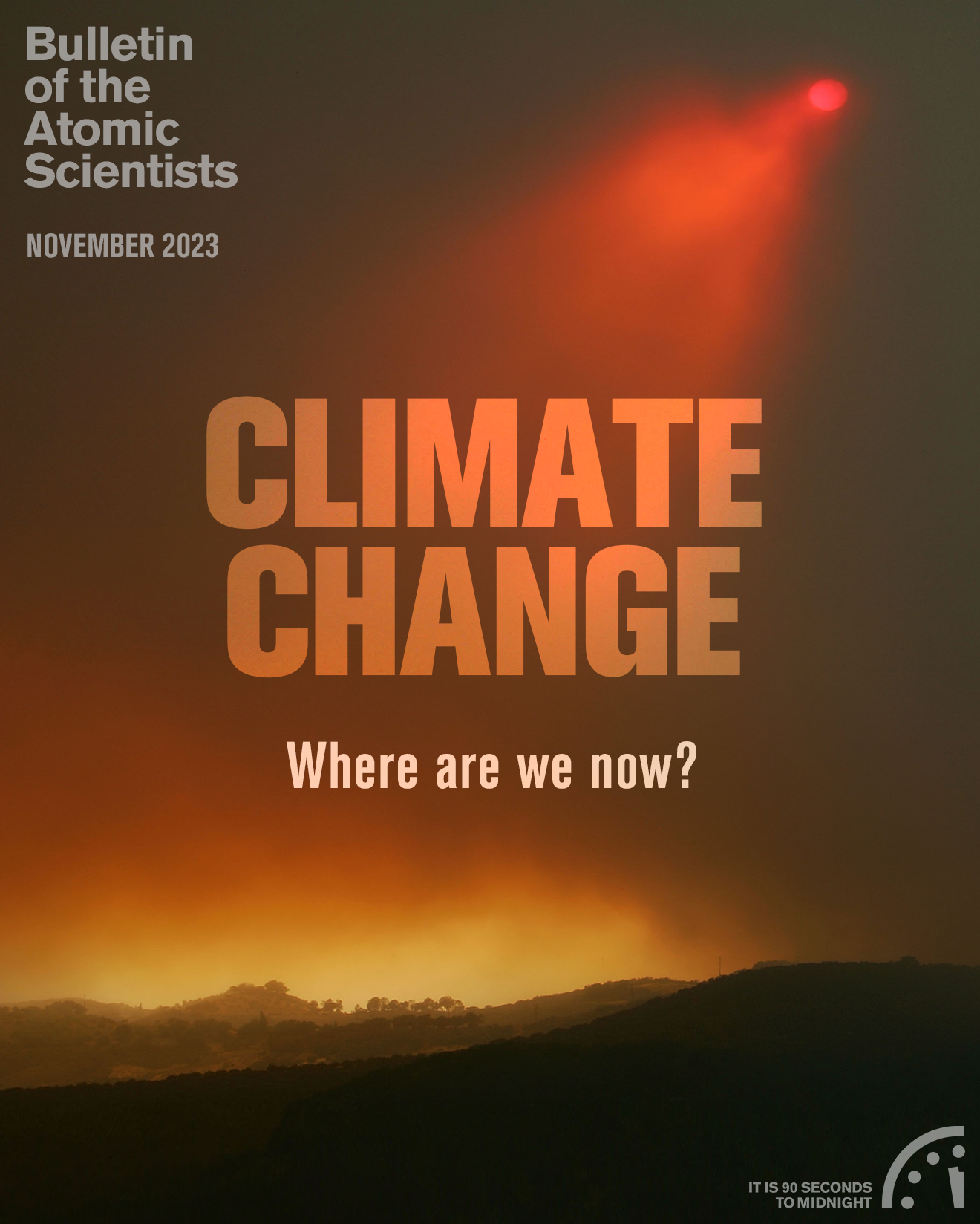Introduction: Climate change—Where are we now?
By Dan Drollette Jr | November 8, 2023
Introduction: Climate change—Where are we now?
By Dan Drollette Jr | November 8, 2023
As anyone who has paid attention to climate news knows, things seem to have gone to extremes—fires in Hawaii, floods in New England, withering heat in the Southwest. Sometimes, different extremes occur in the same geographic area in a relatively short time; the term for such an occurrence is “weather whiplash.” The general idea: With extra heat added to the atmosphere, weather systems are getting out of whack, rapidly going from one extreme to another while also exacerbating other unusual climatic phenomena.
To help redefine the understanding of heat and its risks and dangers—and transform heat from mere numbers on a thermometer into a visceral presence—author Jeff Goodell wrote his new book on climate change, The Heat Will Kill You First: Life and Death on a Scorched Planet. In an interview for this issue of the Bulletin, Goodell explains why he focused on what heat—an invisible force that has real material effects on life (and death)—means for specific humans, in specific locales. Heat, Goodell says, “…can bend railroad tracks, for example. And this book is about what that kind of extreme heat does to living things, and what it does to our ability to live within thermal limits.”
Some who communicate about climate change say that there is one element missing from most journalism on the topic: anger. Emily Atkin, the driving force behind the successful climate publication Heated: A newsletter for people who are pissed off about the climate crisis, says that dry, just-the-facts news coverage isn’t good enough. If reporters don’t speak to the emotional depth of the climate story, Atkin says in my interview with her for this issue, then they’re not really capturing what is happening to the planet. And reporters who settle for regurgitating facts, without putting them in context or getting to the emotional heart of the climate crisis, may be one reason why there is so much delay, and even outright denial, when it comes to climate change.
Meanwhile, researchers such as Beverly Law, Ralph Bloemers, Nancy Colleton, and Mackenzie Allen think that part of the problem in dealing with climate change may lie in how humans think about its unavoidable effects. In their Bulletin essay, “Redefining the wildfire problem and scaling solutions to meet the challenge,” they call for wildfire to be redefined as a building-ignition problem, because defining wildfire itself as the problem is not workable or realistic. “Fires are inevitable, and there will always be wind-driven fires that escape control,” they write. By redefining the problem, they and their colleagues seek to change the focus from trying to control fires to taking preventive measures that protect homes and communities.
Even a short-list of the consequences of climate changes can often lead to feelings of despair, says Anne van Valkengoed, a researcher in environmental psychology at the University of Groningen in the Netherlands. In her article, “Climate anxiety is not a mental health problem. But we should still treat it as one,” Valkengoed argues that climate anxiety is a normal and healthy response—one that can motivate climate action and should therefore not be treated as disorder to be treated with drugs or sleeping pills. But, she says, finding ways to reduce climate anxiety should be an important goal for scientists and practitioners alike. “While climate anxiety is not a mental health problem,” she writes, “it is urgent and necessary that we start treating it like one.”
And not all on the climate front is doom and gloom, as former US Secretary of Energy Steven Chu explains in this issue. Chu—who won a Nobel Prize in physics in 1997 for his work at the legendary Bell Laboratories—sees very promising advances in the near-term in renewable energy, batteries, electric vehicles, and newer technologies. In a wide-ranging interview with me, he tells why there is reason to be hopeful that climate change will be addressed: “The Stone Age did not end because we ran out of stones, it ended because we transitioned to better solutions. And similarly, the oil age will come to an end…”
Together, we make the world safer.
The Bulletin elevates expert voices above the noise. But as an independent nonprofit organization, our operations depend on the support of readers like you. Help us continue to deliver quality journalism that holds leaders accountable. Your support of our work at any level is important. In return, we promise our coverage will be understandable, influential, vigilant, solution-oriented, and fair-minded. Together we can make a difference.
Keywords: climate change, climate crisis, flood, heat wave, renewable energy, wildfire
Topics: Climate Change





















